 Petzlover
Petzlover Azawakh is originated from Mali but Newfoundland Dog is originated from Canada. Both Azawakh and Newfoundland Dog are having almost same height. Azawakh may weigh 55 kg / 121 pounds lesser than Newfoundland Dog. Azawakh may live 5 years more than Newfoundland Dog. Azawakh may have less litter size than Newfoundland Dog. Both Azawakh and Newfoundland Dog requires Moderate Maintenance.
Azawakh is originated from Mali but Newfoundland Dog is originated from Canada. Both Azawakh and Newfoundland Dog are having almost same height. Azawakh may weigh 55 kg / 121 pounds lesser than Newfoundland Dog. Azawakh may live 5 years more than Newfoundland Dog. Azawakh may have less litter size than Newfoundland Dog. Both Azawakh and Newfoundland Dog requires Moderate Maintenance.
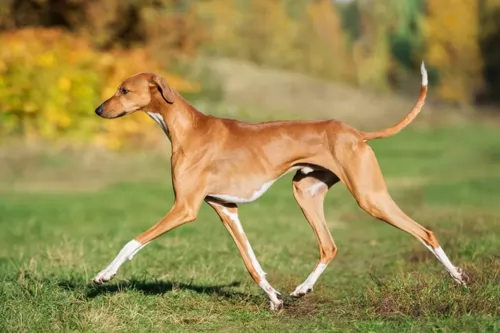 Azawakh dog was bred by the nomads in Africa. They were originally bred to be a guard dog. But, they realized that their body shape and bone structure allows them to run really fast (some say that they can run at the speed more than 65 km/h. This fact made them ideal for the hunting. Nowadays, they can be found across the globe but they are still very rare kind of a dog because they can survive and adapt to very high temperatures but they are very intolerant of low temperatures. Male Azawakh is slightly bigger than a female dog, with a greater instinct for guarding, hunting and taking care of the family and the pact.
Azawakh dog was bred by the nomads in Africa. They were originally bred to be a guard dog. But, they realized that their body shape and bone structure allows them to run really fast (some say that they can run at the speed more than 65 km/h. This fact made them ideal for the hunting. Nowadays, they can be found across the globe but they are still very rare kind of a dog because they can survive and adapt to very high temperatures but they are very intolerant of low temperatures. Male Azawakh is slightly bigger than a female dog, with a greater instinct for guarding, hunting and taking care of the family and the pact.
 The Newfoundland dog is a large working dog. They were bred and used as a working dog for fishermen in the Dominion of Newfoundland, an eastern province of Canada. With their web feet they were also used for water rescue.
The Newfoundland dog is a large working dog. They were bred and used as a working dog for fishermen in the Dominion of Newfoundland, an eastern province of Canada. With their web feet they were also used for water rescue.
The history of the Newfoundland Dog is unsure, but the breed as we know it today originated from dogs which were brought from Newfoundland to England in the early 1800's.
The Newfoundland Club was founded in 1886 so as to promote the breed.
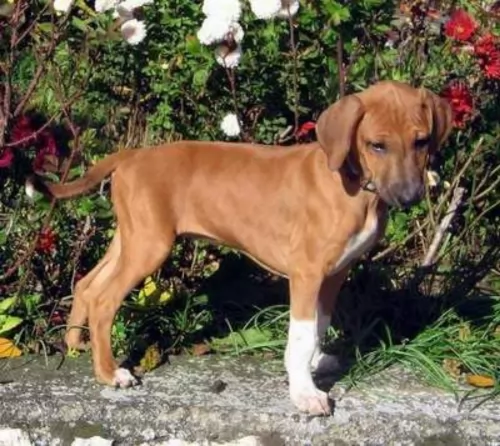 Azawakh is a large dog breed placed in a family of the hounds. It looks almost like any hound we know – slim, with long and skinny legs, with a big-boned chest with a stomach placed up with the spine. They have thin and a bit longer tail, narrow nose and small skull in a triangle shape. Their body may look skinny but it is just the way they should look. Actually, you could probably see the bone structure of the adult Azawakh because they, like any other hounds, have specific muscles – very thin and flat. They can be found in many coat colours like sand, fawn or dark fawn, even brown. Their coat is very short, usually with white marks on the neck, chest and all four paws. In Africa, Azawakh can be found in a diversity of colours.
Azawakh is a large dog breed placed in a family of the hounds. It looks almost like any hound we know – slim, with long and skinny legs, with a big-boned chest with a stomach placed up with the spine. They have thin and a bit longer tail, narrow nose and small skull in a triangle shape. Their body may look skinny but it is just the way they should look. Actually, you could probably see the bone structure of the adult Azawakh because they, like any other hounds, have specific muscles – very thin and flat. They can be found in many coat colours like sand, fawn or dark fawn, even brown. Their coat is very short, usually with white marks on the neck, chest and all four paws. In Africa, Azawakh can be found in a diversity of colours.
 The Newfoundland is a large dog standing at between 63cm to 74cm, both male and female. Weight can vary from 45kg to 80kg.
The Newfoundland is a large dog standing at between 63cm to 74cm, both male and female. Weight can vary from 45kg to 80kg.
He has a double coat of medium-length straight hair and the hair can be black, brown or gray. Although it is common for the Newfoundland to have a solid-colored coats, you will sometimes find small patches of white on their chest, toes, or at the tip of the tail. Then again you get the less common Newfoundlands where the coat is white with some black markings and these are known as Landseers.
The outer coat is coarse, oily and water-resistant quality, suited to a dog that loves to spend time in the water. The head is broad and large with small ears that he keeps lying close to his head. The tail is long and plumed and the feet are wide with webbing between the toes which aids him with swimming.
As with many large dogs, the Newfoundland is docile and his sheer size makes it that he is best suited to life in the countryside as opposed to living in the city. This is also because this particular dog wants to be close to water where he can swim.
He is a trustworthy, loyal dog and will get on well with children and pets in the home. Training and socialization is always recommended for any dog, but a big dog can often ‘get in the way’ indoors and you want him to lie down or sit when you tell him to. He is an intelligent dog so will respond well to training.
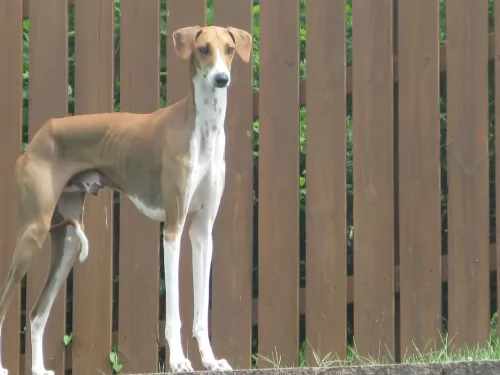 Once Azawakh is a part of the family, he will try to find his place. If you teach him that you are the main figure, they will be obedient and affectionate pet. They love children, and they will surely be always close to them, guarding them and making sure they are safe.
Once Azawakh is a part of the family, he will try to find his place. If you teach him that you are the main figure, they will be obedient and affectionate pet. They love children, and they will surely be always close to them, guarding them and making sure they are safe.
canine freestyle sports, heelwork to music competitions.
If your Azawakh pet is trained well and socialized, they can fit in almost anywhere. Some will say that they hate cats, but there are some cases where they were raised with them and they did just fine. They will be quite tolerant of a stranger in your house. Since they get attached to the family, it is not recommendable to consider this breed as a new-owner kind of pet.
Once you set yourself as a pact leader, you will have almost no problems with training your dog various tricks. Azawakh is an intelligent breed, they learn quickly and they will be more than happy to show you every day what they have learned. It is necessary to start socializing your Azawakh dog while he is still a pup. They don’t respond well to harsh methods of teaching so you should really avoid them.
 Your beautiful, cuddly puppy will soon become a giant dog with a big appetite. Don’t just buy a cute puppy if you can’t afford to feed him properly and you can’t give him lots of attention.
Your beautiful, cuddly puppy will soon become a giant dog with a big appetite. Don’t just buy a cute puppy if you can’t afford to feed him properly and you can’t give him lots of attention.
Your dog will also be shedding, so be aware of these aspects before you bring a large Newfoundland into your home. He is a gentle dog, but his size could be worrisome if he isn’t trained, socialized and supervised.
Newfoundlands are amicable dogs, and while he may like to spend times indoors with you relaxing, he is a working dog and will require exercise and activities for mind and body.
Give this giant of a dog a loving home, and you will have a special, devoted friend like no other.
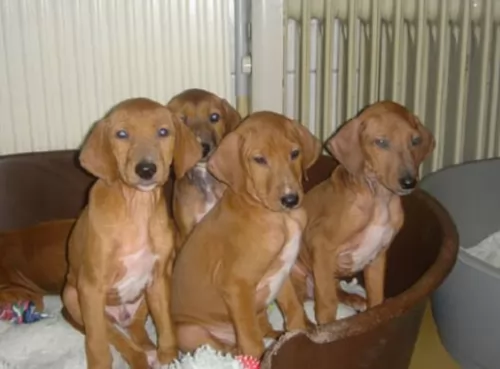 The Azawakh breed is very rare and this kind of information cannot be still guaranteed. If they are bred with a healthy family, they are usually very healthy and don’t need much of the vet care. Some of the diseases that were found in a medical history of this magnificent dog report heart problems (usually caused by their super high need of daily activity), problems with the thyroid glands, and skin diseases caused by the increased secretion of the thyroid glands which causes their skin to become dry and in some cases even the loss of the hair.
The Azawakh breed is very rare and this kind of information cannot be still guaranteed. If they are bred with a healthy family, they are usually very healthy and don’t need much of the vet care. Some of the diseases that were found in a medical history of this magnificent dog report heart problems (usually caused by their super high need of daily activity), problems with the thyroid glands, and skin diseases caused by the increased secretion of the thyroid glands which causes their skin to become dry and in some cases even the loss of the hair.
 The Newfoundland can be prone to serious health conditions such as hip dysplasia and gastric torsion. Deep chested dog breeds like the New Foundland are susceptible to bloat, a life threatening condition where the stomach swells, it can twist and the dog can die if help isn’t available. He will be salivating, restless and whining while also trying to vomit.
The Newfoundland can be prone to serious health conditions such as hip dysplasia and gastric torsion. Deep chested dog breeds like the New Foundland are susceptible to bloat, a life threatening condition where the stomach swells, it can twist and the dog can die if help isn’t available. He will be salivating, restless and whining while also trying to vomit.
Giant breeds are also prone to elbow and hip dysplasia, a genetic problem which can ultimately affect your dog’s mobility.
When in any doubt about your pet’s health, get him to the vet.
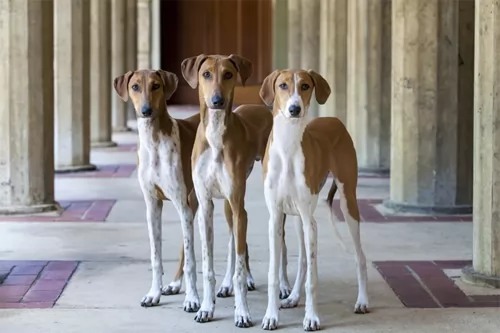 The Azawakh bred has a high risk of the obesity. They must be fed with special care since the food they eat can affect the thyroid glands function. They should never be overfed by average dry dog food. You will be advised to give them food with little percentage of the protein. They drink a lot of water and they like the dairy products. Their meals shouldn’t include fruits and vegetables, and some grains (millet, rice). They do not need to eat a lot of meat, but you can add some chicken in their meals.
The Azawakh bred has a high risk of the obesity. They must be fed with special care since the food they eat can affect the thyroid glands function. They should never be overfed by average dry dog food. You will be advised to give them food with little percentage of the protein. They drink a lot of water and they like the dairy products. Their meals shouldn’t include fruits and vegetables, and some grains (millet, rice). They do not need to eat a lot of meat, but you can add some chicken in their meals.
Puppies should be fed three times per day. Their portions should be small and diverse. Keep in mind to feed them at the same time each day because their metabolism will be formed by this. Adult dogs are fed two times per day, at the same time as well. After the meal, let them rest for an hour or two and never give them meals right after high physical activity.
If you want your Azawakh dog to be healthy and happy make sure you provide them with enough space to run, explore, dig holes and always have some fresh water. They don’t need regular vet checks, but if you notice some changes in their digestion, lower activity or skin abnormalities, it is very important to take them to the vet station. They should never be kept indoors, so if you are living this kind of life maybe this kind of dog is not for you. But, if you are super active and if you have a couple of hours per day to spend with your Azawakh, maybe you can make him feel a lot better.
Since they like the warmer climate, you can take them running with you. They will be a great companion while you bike and leave them leash free but only if he is trained to stay by your side. If you have a yard, make sure to leave some areas free for digging and hiding their special toys or treats. They are extremely playful and cheerful, so they will wander off in no time. Some of the Azawakh dogs were great on the hiking trips, so you can try this daily activity once you train him to listen to you.
 Your dog’s coat will need to be brushed at least twice a week as he is a heavy shedder.
Your dog’s coat will need to be brushed at least twice a week as he is a heavy shedder.
Do the nails of your dog as soon as they start getting long. Long nails can hook on things and cause injury to the dog’s paw area.
This is a dog with floppy ears so check inside the ears to prevent ear infections, more so because this is a water-loving dog. The dampness inside the ears can cause bacteria.
This is a giant breed and sadly, they have the shortest lifespans. You want to make sure that you keep your giant breed as healthy as possible to ensure he reaches the 10 or so years allotted to him and to also prevent health problems.
Make sure your giant breed puppy and adult has the very highest quality commercially manufactured food to ensure he gets the right balance of nutrients in. This food also makes sure that your puppy rather grows at a slower rate and stronger as opposed to growing too quickly. Rapid growth comes with joint problems.
All dogs, large and small, don’t want exotic, strange food that upsets their stomachs. They want consistency and simplicity and they want tasty food. Give him some homemade food such as cooked chicken, brown rice or pasta and some vegetables such as sweet potato, carrots and spinach. You can add this occasionally to his dry kibble.
Add in some raw meat from time to time too. Your pet will be strong, healthy, happy and content.